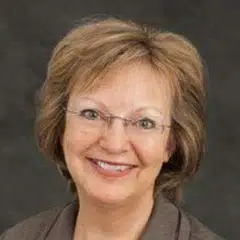Fiji an important regional power broker as great power politics intensifies in the Pacific
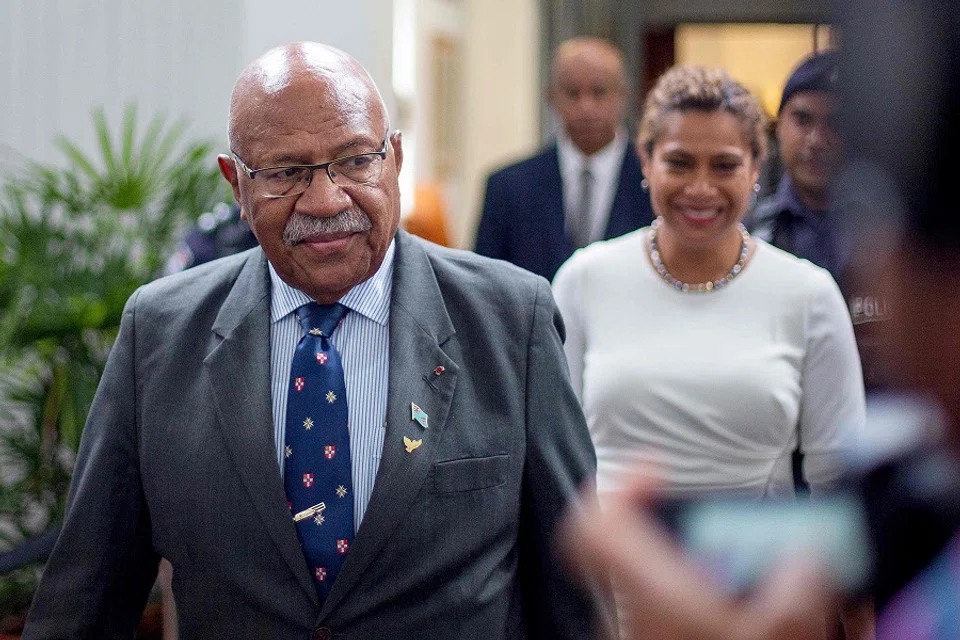
After a continuous 16 years of Frank Bainimarama at the helm of Fiji's government, Fijian voters were ready for change. A tripartite coalition was formed between the People's Alliance, National Federation Party and the Social Democratic Liberal Party (SODELPA) after Bainimarama's Fiji First party lost its majority.
The new prime minister is the colourful previous opposition leader Sitiveni Rabuka, a long-time rival of Bainimarama, and - like him - also a previous military coup leader and prime minister. Last year, Rabuka founded his own party, People's Alliance, after being ousted as the leader of SODELPA. Fijian party politics can be complex affairs reflecting old allegiances, past political fights and the influence of traditionally powerful village chiefs.
A slim majority for the opposition
On 14 December, some 690,000 Fijians, about 58% of eligible voters, went to the polls for the third general election since the last military coup in 2006 which was led by incumbent prime minister Bainimarama. During the election campaign, the opposition accused the government of intimidating and oppressing political opponents.
Over the last two elections, Bainimarama's Fiji First had gradually lost its voter appeal, achieving only 42.5% of the votes with 26 parliamentary seats this time, not enough to form a government.
Its GDP contracted by 7.1% in 2020 and its fiscal deficit rose to 13.7% in 2020/21.
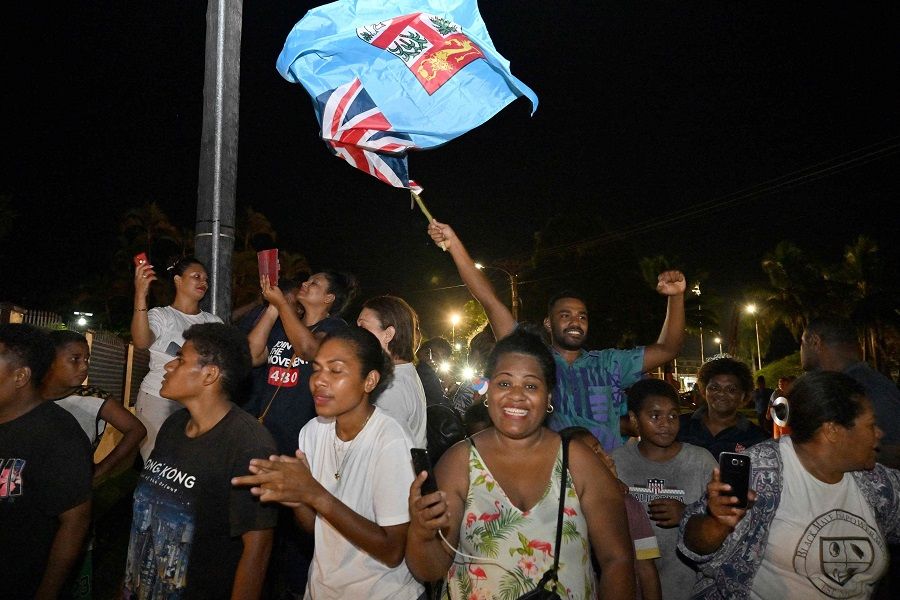
The strongly Christian-based and anti-China social democratic party SODELPA with only three parliamentary seats joined two other opposition parties, People's Alliance and National Federation Party. The new government was elected with a razor-thin majority of 28 to 27 parliamentary votes and sworn in on 24 December.
Prime Minister Rabuka announced in his first address to the nation that his government will reverse some of the restrictive policies of the previous government and introduce more democratic reforms and participatory democracy. Opposition leader Bainimarama has claimed this peaceful democratic transition to a new government as his political "legacy".
Election focus: inflation, poverty, ethnic issues
Fiji, with a population of about 900,000 and a per capita income of US$ 5,000 had suffered badly during the Covid pandemic because of its strong dependency on tourism. Its GDP contracted by 7.1% in 2020 and its fiscal deficit rose to 13.7% in 2020/21.
Major donors such as the Asian Infrastructure Investment Bank (AIIIB) and the Asian Development Bank (ADB) supported the government's recovery policies and stimulus packages but warned of a debt problem. Unemployment, especially among youth, is high and with the present high inflation, some Fijians are experiencing poverty.
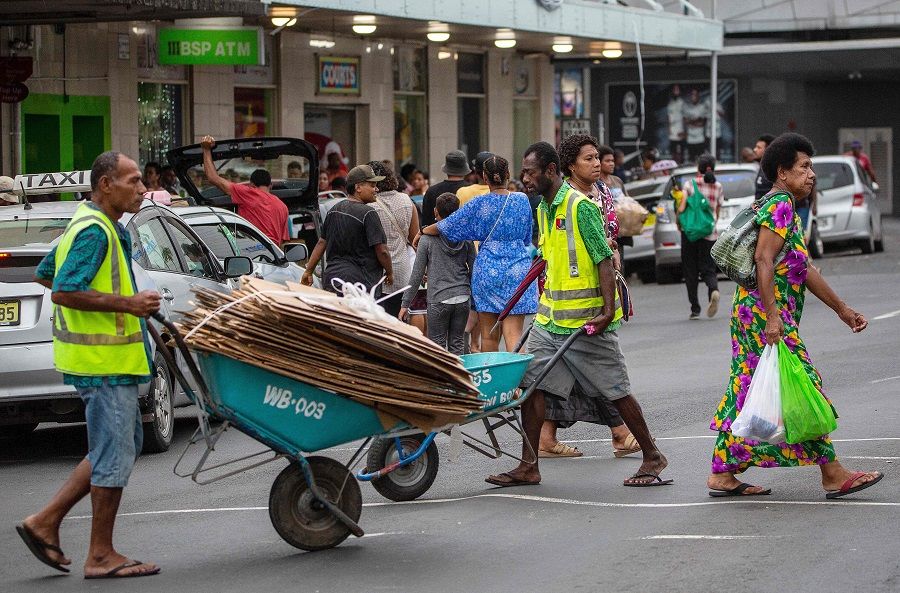
Major election issues were inflation, poverty, high national debt, ethnic tensions between Polynesian Fijians and the Indian-Fijian minority as well as rising violence against women, a topic propagated by the female candidates of five opposition parties.
China and Fiji have had political and economic bonds since the 2006 military coup, when Fiji started its "look North" policy.
Fiji as regional power
Fiji as the second largest country and economy in the region, is an influential regional leader and has wielded considerable clout in the regional governing body of the Pacific, the Pacific Island Forum (PIF). After Bainimarama's second military coup in 2006, political and economic sanctions were imposed on Fiji by a number of Western countries such as Australia, New Zealand, the US and the EU and its PIF membership was suspended in 2009. In defiance, Bainimarama turned to China for political and economic support.
China and Fiji have had political and economic bonds since the 2006 military coup, when Fiji started its "look North" policy. Both countries established the China-Pacific Economic and Development Forum in 2006, which formed the basis of Fiji's close cooperation with China, including considerable Chinese investments in the country.
With China's technical and financial assistance, Fiji also founded the Pacific Islands Development Forum (PIDF) in 2013 as a rival forum to the PIF to "better serve the development needs" of Pacific nations. In addition, China has long supported the Fijian Armed Forces with military hardware and training. After Bainimarama legitimised his rule through parliamentary elections in 2014, Fiji was readmitted to the PIF and also turned to Western countries for development support.
The new competition in the Pacific region between the US and its allies Australia and New Zealand on the one hand and China on the other, has made Fiji an important regional power broker.
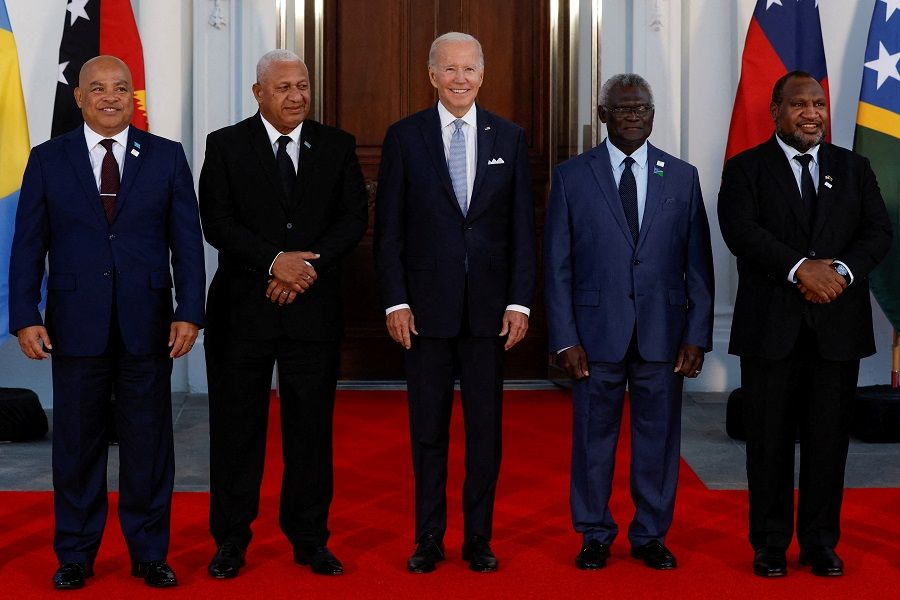
The new competition in the Pacific region between the US and its allies Australia and New Zealand on the one hand and China on the other, has made Fiji an important regional power broker. Unlike some other members of the PIF, Fiji finely balanced its relations with China and the West.
Fiji also became the seat of many regional bodies such as the PIF Secretariat and the University of the South Pacific and numerous international agencies. It has proven its international commitment as a long-time major contributor to UN peacekeeping forces.
In the last few years, Fiji raised its international profile and became a strong UN climate advocate criticising its Australian neighbour for being a climate laggard. Then Prime Minister Bainimarama tweeted after meeting Australian Foreign Minister Penny Wong in May 2022 in Fiji: "Our main concern isn't geopolitics - it's climate change."
Fiji's presidency of the climate conference COP 23 in Bonn in 2017 was a highlight of the Pacific Islands' global climate engagement and established his reputation as one of the leading Pacific climate voices.
Already in 2019, the PIF countries rejected the idea that they have to choose between China and the West.
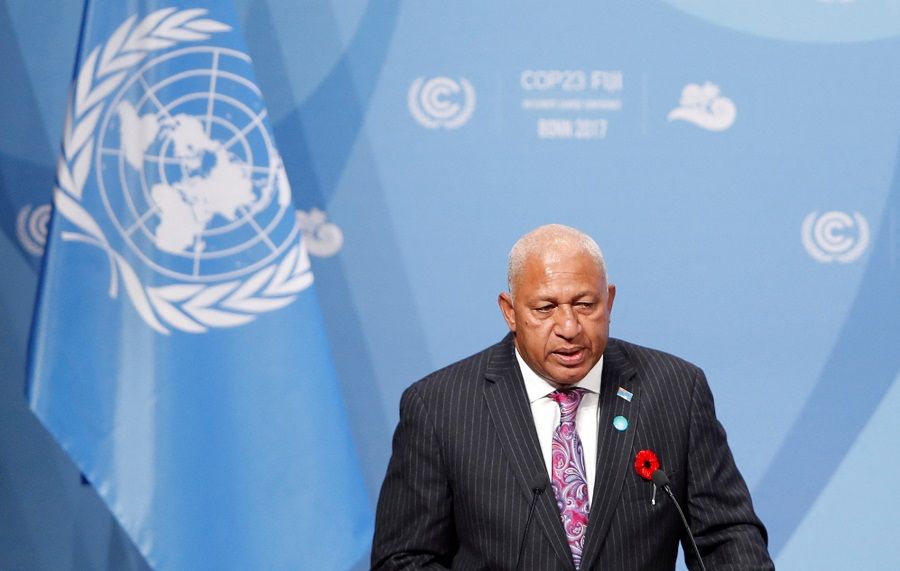
Bainimarama's chairmanship of the PIF in 2021/22 was filled with high political drama in the region. He successfully managed the regional tensions after the withdrawal from the PIF of one member country, Kiribati, as well as the signing of a controversial security treaty between the Solomon Islands and China in April. Bainimarama also navigated the 16 PIF member countries through the passing of PIF's 2050 Blue Pacific Strategy which focuses on the Pacific's development needs.
Already in 2019, the PIF countries rejected the idea that they have to choose between China and the West. "Friends to All, Enemy to None" is their often-cited roll call. PIF leaders emphasised at their summit last July under the chair of Bainimarama that regional security issues need to be resolved within the "Pacific family".
US and Australia courting Fiji
With the growing US-China confrontation in the Pacific, the US recently started a strong re-engagement in the South Pacific after the surprise of the Solomon-China treaty which it feared would threaten America's traditional strategic dominance in the region. In the last decades, the US had neglected the South Pacific. Apart from its traditional ties with the Marshall Islands, Palau and the Federated States of Micronesia, it had closed most embassies in the South Pacific and reduced its aid programmes. Its trade with the countries is minimal.
The US also pledged help in controlling illegal fishing and has recently concluded a multinational maritime exercise in the region...
Fiji has now become the main focal point of the US geopolitical strategy. After many decades of absence of high-level visits, US Secretary of State Anthony Blinken visited Fiji in February and President Joe Biden signed a US-Pacific Partnership Agreement with 12 Pacific countries in Washington and announced a Pacific Aid programme with US$800 million spread over ten years.
The US and Fiji also strengthened security ties by signing a landmark defence and security agreement in 2020. The US also pledged help in controlling illegal fishing and has recently concluded a multinational maritime exercise in the region - the first time with Fiji participating. Already in 2020, both countries had signed a bilateral trade and investment agreement (TIFA). Fiji has also joined the new 14-member US economic initiative, the Indo-Pacific Economic Framework for Prosperity (IPEF), being the only Pacific Island country to do so.
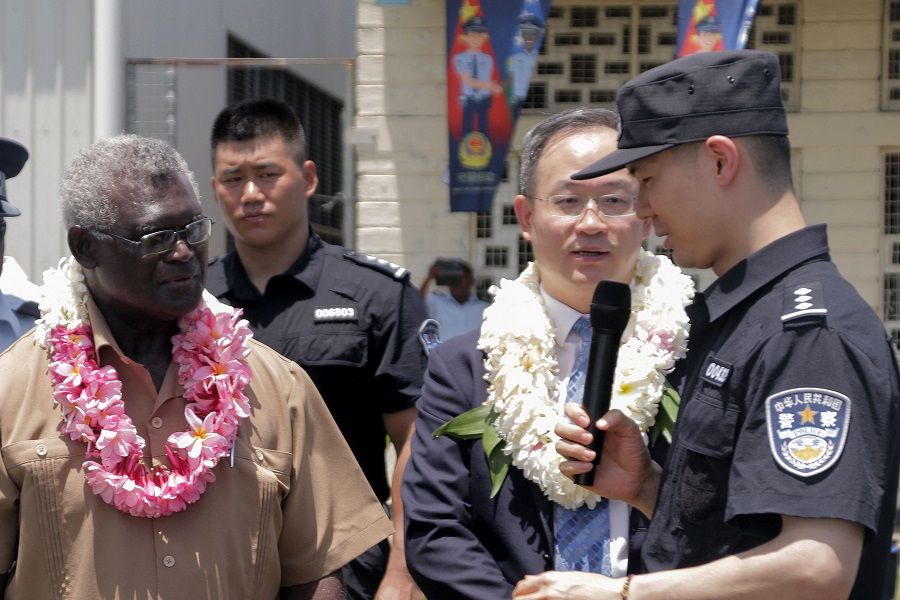
To counter Chinese engagement in the region, Australia too has as well intensified its relations with the Pacific and substantially increased its aid to the Pacific, tightened its previously unambitious climate policy and vowed to work together with the Pacific Island countries on a more equal footing.
So far, Fiji has been carefully balancing its political and economic relations with China, the US, Australia and New Zealand.
While China has been giving large amounts of grants, Australia remains the biggest aid donor to Fiji. Both countries recently concluded a Status of Forces agreement. Together, they have been redeveloping the Disaster and Humanitarian Relief Blackrock Camp for the Fijian Armed forces.
So far, Fiji has been carefully balancing its political and economic relations with China, the US, Australia and New Zealand. The political powerbroker SODELPA has indicated that, in future, it wants Fiji to closely align with Australian and New Zealand foreign policies.
It remains to be seen whether the new Fiji coalition government is durable and stable. However, one can be sure that Fijians as well as their regional neighbours and major powers will be watching the developments of the next few months very closely.
This article was first published by RSIS Commentary, S. Rajaratnam School of International Studies, Nanyang Technological University on 30 December 2022.
Related: Power struggles and Chinese influence in the Pacific island region | The South Pacific Ocean: Another battleground for China-US competition? | China gearing up for intense competition in the Pacific | China-Solomon Islands security pact: Alarm bells ringing for Australia and New Zealand? | Will China-Solomon Islands security cooperation bring new tensions to the South Pacific?
